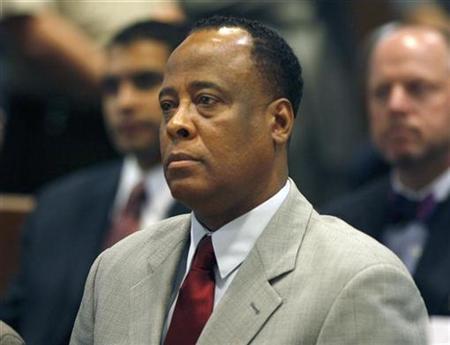Attorneys for Jackson doctor hint at a defense

An attorney for Michael Jackson's doctor on Friday hinted that the pop star may have killed himself with the drug propofol, even as prosecutors tried to bolster their claim the singer's physician committed manslaughter.
On the fourth day of a hearing to decide if Dr. Conrad Murray will stand trial for involuntary manslaughter in the singer's sudden death, prosecutors called a woman with whom Murray had an affair to testify about receiving packages from a pharmacy that court records show supplied him with propofol.
Coroner's investigator Elissa Fleak also testified to finding at Jackson's home 12 bottles of the powerful anesthetic -- typically used in hospitals but which Jackson used as a sleep aid -- including several in a bag marked "baby essentials."
Fleak said she found most it four days after Jackson died on June 25, 2009 of a drug overdose, and that near his bed were an open box of hypodermic needles and one empty bottle of propofol.
Defense attorney J. Michael Flanagan seized on her testimony to ask if a man Jackson's size, from his bed, could reach the needles.
"If a person about 136 pounds and 5'9" was on the bed, they should be able to reach them, right?" Flanagan asked.
Prosecutors quickly objected and a judge agreed the question was speculation. Still, it pointed to a claim made one week ago in court by prosecutors who warned the defense would offer up a theory Jackson killed himself.
At the time, Flanagan declined to disclose what the defense's strategy may be, and outside the courtroom on Friday, he told Reuters the defense strategy was still developing.
THE DOCTOR'S GIRLFRIEND
Elsewhere Nicole Alvarez, 29, who said she met Murray in 2005 at a Las Vegas strip club where she worked, testified to receiving at least half a dozen packages from Applied Pharmacy Services, the Las Vegas-based business that, according to court records, sold Murray propofol.
She could not say if the packages she received contained the powerful anesthetic because she had not looked.
"Dr. Murray and I were on a need-to-know basis," she said. "I just know my place and my position in his life, and that was just not my duty to know the details of his business."
Propofol is an anesthetic often used in hospitals for surgery, but Murray gave it to Jackson at home to help him sleep. Murray, who had offices in Houston and Las Vegas, had been hired to care for Jackson ahead of a series of concerts.
Murray has admitted giving Jackson propofol, which coroners determined was the principal cause of his death, but Murray has pleaded not guilty to the charge against him.
At the time he died, Jackson also had several other drugs in his system including the sedative lorazepam.
In previous testimony, a security guard has said Murray ordered him to collect medical vials and hide them in bags before calling an ambulance for help the day Jackson died.
The hospital doctor who pronounced Jackson dead testified Murray failed to tell her he had given the singer propofol and that she never heard of it being used in a home setting.
Prosecutors are seeking to establish that Murray was negligent in his care of the singer and, knowing that, tried to cover up his mistakes on the day Jackson died.
The preliminary hearing is expected to end toward the latter part of next week. If a judge decides that enough evidence exists, Murray will be ordered to stand trial.
 0
0 






